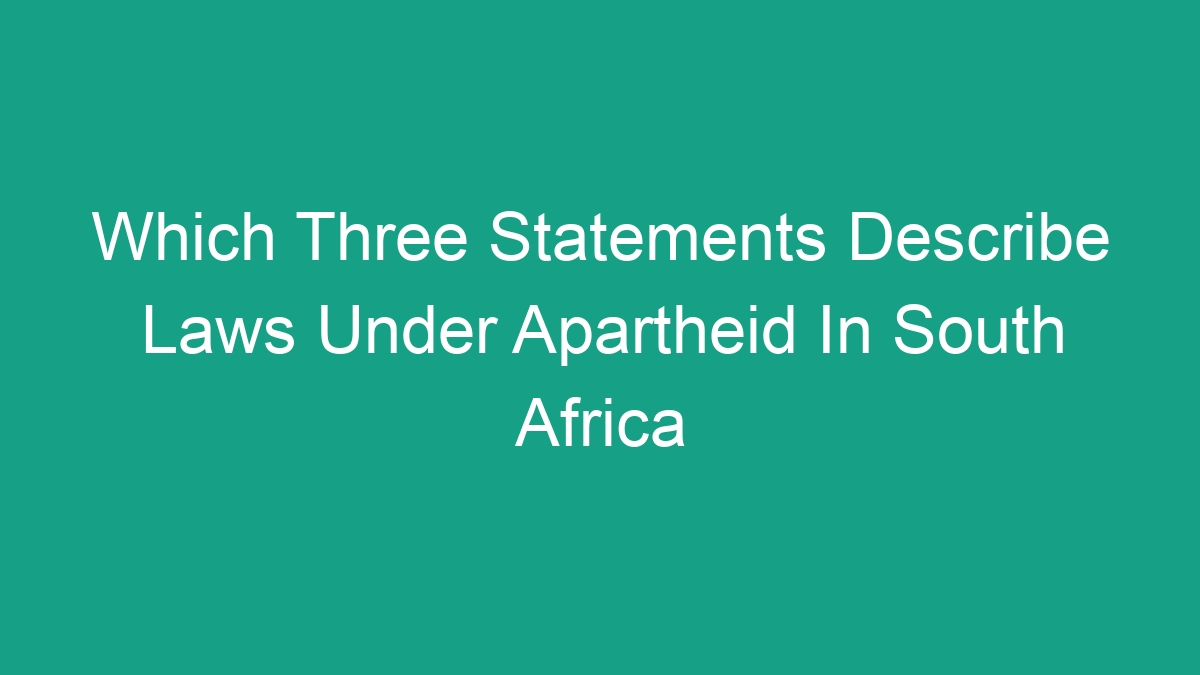
Introduction
South Africa’s history is marked by the implementation of the apartheid regime, a system of institutionalized racial segregation that lasted from 1948 to the early 1990s. During this time, the government enforced numerous laws that aimed to enforce racial segregation, discrimination, and oppression. These laws, which were designed to maintain the dominance of the white minority over the black majority, had far-reaching and devastating effects on the lives of South Africans. In this article, we will explore three key statements that describe the laws under apartheid in South Africa.
The Pass Laws
One of the most infamous and dehumanizing laws under apartheid was the Pass Laws. These laws required all black South Africans to carry identification documents at all times, commonly known as “passes” or “dompas”. The passes were used to control the movement of black people and regulate their access to urban areas, where they were mostly required for work.
The Pass Laws were degrading and oppressive, as they restricted the freedom of movement and reinforced racial segregation. These laws also resulted in the forced removals of black people from urban areas to distant and impoverished homelands, disrupting families and communities. The Pass Laws were a tool of control and subjugation, serving as a constant reminder of the inferior status of black South Africans in their own country.
The Group Areas Act
Another key component of the apartheid laws was the Group Areas Act of 1950. This act enforced the segregation of residential and business areas according to race, effectively designating specific areas for different racial groups. Under this law, the government forcibly removed non-white populations from areas designated for white people, and vice versa. This led to the creation of racially segregated neighborhoods and the destruction of vibrant and diverse communities.
The Group Areas Act was a clear manifestation of the apartheid government’s commitment to maintaining racial division and hierarchy. It entrenched the physical separation of different racial groups and reinforced the ideology of white supremacy. This law had a lasting impact on the spatial organization of South African cities and the distribution of resources, perpetuating inequality and injustice for generations.
The Bantu Education Act
Education played a crucial role in the apartheid system, as it was used as a tool for social engineering and control. The Bantu Education Act of 1953 was a key piece of legislation that epitomized the government’s approach to education for black South Africans. Under this act, the government drastically limited the educational opportunities available to black students, providing them with a separate and inferior system of education compared to white students.
The Bantu Education Act aimed to prepare black students for menial and low-skilled jobs, perpetuating the cycle of poverty and inequality. The curriculum was heavily censored and controlled to indoctrinate students with the ideology of white supremacy and to prevent them from questioning the status quo. This deliberate undermining of black education had profound and long-lasting effects on the intellectual development and economic prospects of black South Africans.
Conclusion
In conclusion, the laws under apartheid in South Africa were characterized by their systematic and institutionalized discrimination, oppression, and segregation of non-white populations. The Pass Laws, the Group Areas Act, and the Bantu Education Act are just three examples of the numerous laws that were enacted to enforce racial inequality and maintain the dominance of the white minority. These laws had profoundly devastating effects on the lives of black South Africans, shaping their experiences and opportunities for generations.
While apartheid officially ended in the early 1990s, its legacy continues to impact South African society today. Understanding the laws under apartheid is crucial for acknowledging the deep-rooted injustices of the past and working towards a more equitable and just future for all South Africans.



